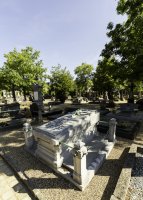Description
The family of Mathias Schaaf and Marie-Anne Gengler, the last owners of the burial plot before the City of Luxembourg took it over in 2018, had its roots in Ettelbruck. In 1879, the family, whose forebears had historically been farmers, moved its fabric, curtain and household linen shop from Route de Diekirch in Ettelbruck to the intersection of Rue de la Reine and Rue du Fossé in Luxembourg City, near Place Guillaume II. Mathias Schaaf-Gengler bought his wares in London and Paris and opened a men's and women's clothing shop in Luxembourg City. The family was among the trailblazing retailers who sold items produced on an industrial scale, and specialised in a single trade. The merchandise was sold at set prices and changed every season. The firm sold work clothing, aprons, ceremonial clothing and coats. Edmond Schaaf took over the business from his father in 1889.
His sister, Marie Schaaf, married Jules Salentiny (1854–1931), who is also buried in this vault and was an honorary director of the Water and Forestry Agency (Administration des Eaux et Forêts) from 1923, member of the Grand-Ducal Institute (Institut Grand-Ducal), member of the Supreme Forest Council (Conseil Supérieur Forestier), and Officer of the Order of the Oak Crown. Jules Salentiny began his career in 1879 as an assistant forester, and went on to serve as a forest ranger in Mersch (1894), inspector (1909) and then Director of Water and Forests in Luxembourg City. His forestry policy was always guided by the goal of expanding the government's territory. The son of Jules Salentiny and Marie Schaaf (1859–1941), Jules Salentiny (1894–1962) was sworn in as a barrister in 1919.
In 1921 he passed the notary's examination. In 1922 he became a deputy judge in the magistrate's court, then later a judge in the Diekirch district court and a judge in the Luxembourg district court. He subsequently became an examining magistrate, and in 1935, was appointed to the bench in the Supreme Court of Justice. He ended his career as the presiding judge of the Court of Justice. In 1926, Salentiny took a stance on the prenuptial medical certificate from the legal and social perspective, standing out with his progressive views: "We cannot emphasise strongly enough that working as a prostitute – irrespective of any issue of morals or of law and order – constitutes only the right to use one's body and person freely, and consequently, within the meaning of the Criminal Code, prostitution should not be considered an offence and repression is not warranted" ("Regelung des ältesten Gewerbe", in D’Lëtzebuerger Land of 12 March 1965).


















